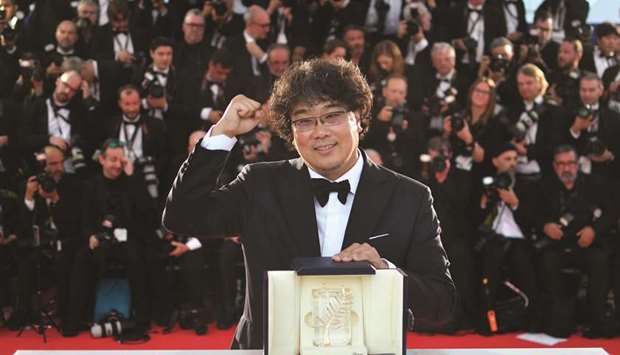Parasite, a black comedy about a family of clever scammers from South Korea’s underclass, won the Cannes Palme d’Or top prize yesterday.
Director Bong Joon-ho, 49, became the first Korean in the festival’s 72-year history to scoop the coveted award, which critics said powerfully tapped into the tensions caused by the widening gap between rich and poor around the world.
“I was a little boy who was crazy about cinema since I was 12 years old,” Bong said, hoisting the palm-frond statuette in the air.
Despite some of his strongest reviews in years, Quentin Tarantino failed to win the jury’s favour with Once Upon a Time in Hollywood, which brought together two of Tinseltown’s most dashing leading men, Brad Pitt and Leonardo DiCaprio, for the first time.
Instead Mati Diop, the first black woman to compete for Cannes’ top prize, was runner-up for Atlantics, a chilling ghost story about Senegalese migrants dying at sea.
Spanish star Antonio Banderas captured the best actor prize for Pedro Almodovar’s hit Pain and Glory, a loosely autobiographical picture based on the director’s colourful life.
“I respect him, I admire him, I love him, he’s my mentor and he’s given me so much in my entire life that this award, obviously, has to be dedicated to him,” Banderas said of Almodovar, who cast the actor in eight films and helped make him a global box office draw.
Belgium’s Dardenne brothers, already two-time winners of the Palme d’Or, clinched the best director gong for Young Ahmed about a teenage boy who falls under the influence of an Islamist hate preacher.
“Thank you to the jury for recognising this film, which we saw as an ode to life,” Luc Dardenne said of the film’s ultimately hopeful message.
His elder brother Jean-Pierre said the movie offered an optimistic vision “in these dark and difficult times with identitarian populism on the rise”.
Britain’s Emily Beecham – whose mother is American – won best actress for Little Joe, a feminist sci-fi thriller by Austria’s Jessica Hausner about the mysterious powers of a bio-engineered plant.
The third-place jury prize was shared by the gritty French police drama Les Miserables and Brazil’s Nighthawk, a darkly satirical Western seen as a searing indictment of life under the country’s far-right President Jair Bolsonaro.
Best screenplay went to France’s Celine Sciamma, one of four women in competition, for Portrait of a Woman on Fire, a lushly subversive lesbian love story set in the 18th century.
Many critics loved Tarantino’s rollicking odyssey through the Los Angeles of 1969 in the period leading up to the Manson family murders, particularly Pitt’s performance as a hoary stuntman.
However the director – who won the Palme d’Or 25 years ago for Pulp Fiction – collected the Palm Dog prize on Friday for Cannes’ best canine performance, joking: “At least I do not go home empty-handed.”
No Cannes is complete without a scandal and it was one of France’s top directors who delivered the shocker this year.
Critics overwhelmingly dismissed Abdellatif Kechiche’s Mektoub, My Love: Intermezzo, an ode to pole dancing and women’s back sides, as a pointless jiggle fest that exploited its female cast.
It was also ignored by the jury, which picked the winners from 21 contenders.
The Camera d’Or for best first feature film went to Guatamala’s Cesar Diaz for Our Mothers, a drama about those “disappeared” during the country’s brutal civil war.
The jury gave a special mention to Palestinian filmmaker Elia Suleiman’s It Must Be Heaven, focusing on the shifting experiences of an exile who goes on a meandering odyssey from his hometown of Nazareth to the streets of Paris and New York.
Brazilian director Karim Ainouz won the top prize in the festival’s more experimental section, Un Certain Regard, with The Invisible Life of Euridice Gusmao.
He dedicated the win for his story of two women struggling against repression in the 1950s to “all the women of the world”.
Catalan director Albert Serra’s Freedom took a special jury prize.
And Franco-Italian actress Chiara Mastroianni, the daughter of screen legends Catherine Deneuve and Marcello Mastroianni, won best performance for Christophe Honore’s On a Magical Night.
The Oeil d’Or (Golden Eye) award for best documentary went to For Sama, Syrian Waad al-Kateab’s harrowing love letter to her infant daughter shot inside besieged Aleppo.

South Korean director Bong Joon-ho poses during a photocall after he won the Palme d’Or for the film Parasite (Gisaengchung).
